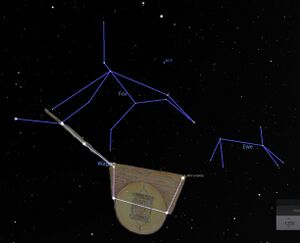Erra

dErra is an Akkadian name for the King of the Underworld, more commonly known as Nergal, and associated with mulKA5.A (the Fox, an asterism in Ursa Major). Erra is already in use as a name for an Akkadian asterisms in the Old Babylonian Prayers to the Gods of the Night, but there cannot be positively identified with 'The Fox'-asterism as is explicit in MUL.APIN.
Dictionary
Hoffmann and Krebernik (2023)
Reading the first list of MUL.APIN as an explanatory list:
| explanandum | explanans | |||
|---|---|---|---|---|
| counting | line number | DIŠ | asterism | deity |
| 16 | I i 15 | 1 | mulMAR.GÍD.DA | dNin-líl |
| 17 | I i 16,17 | 1 | MUL šá KI za-ri-i šá mulMAR.GÍD.DA GUB-zu | mulKA5.A | dÈr-ra gaš-ri D.meš |
| translation | ||||
| 16 | I i 15 | 1 | STAREREQQU(Wagon) | GODNinlil |
| 17 | I i 16,17 | 1 | asterism by the pole of STAREREQQU : STARŠĒLEBU(Fox) | GODErra, the strong of the gods |
Akk. name of Nergal, the ruler of the netherworld. dÈr-ra (EN 17r).
Kurtik with Hilder, Hoffmann, Horowitz, Kim
= dIr3-ra "Erra, Irra"; deity of war and plague, one of the names of Nergal [Roberts 1972, 21-29; Tallqvist 1938, 329];
- 1) a group of stars in the constellation of the Great Bear,
- 2) Mars.
| Sources | Identifications |
|---|---|
"Prayers to the Gods of the Night."
|
|
MUL.APIN.
|
|
"Ishum and Erra."
|
Additional
II. Identification.
As a constellation:
See k06 KA5.A.
As planet Mars, see below.
III. Astrology.
(1) Pleiades and Erra (= Mars?);
- UL.UL ni-iḫ-su-ma UD.DA-su-nu NU GAL2 dIr3-ra ZI-ma UN.MEŠ ul u2-[šam-qat]
- "If the Stars (stand) aside and have no light: Erra will rise, but will not kill men" [BPO 2, XV 29 + Parallels].
Historical Dictionaries
| Kurtik (2022, e20) | Gössmann (1950) |
|---|---|
| = dIr3-ra «Эрра, Ирра»; божество войны и чумы, одно из имен Нергала [Roberts 1972, 21–29; Tallqvist 1938, 329]; 1) группа звезд в созвездии Большой Медведицы, 2) Марс(?).
I. Источники. «Молитвы ночным богам». Старовавилонская молитва: a) Erm. 15642: qu2-ra-du-um dEr3-ra «Героический Эрра» [Horowitz 2000, 196–197:16], а также [Шилейко 1924, 147; Dossin 1935, 180; von Soden 1936, 306], b) AO 6769: qu2-ra-du Ir-ra [Dossin 1935, 181–182:16; Horowitz 1996, 60], c) CBS 574: ˹qu3-ra˺-[d]u [I]r3-ra [Horowitz–Wasserman 1996, 58:13]. MUL.APIN. Звезды Энлиля (№ 16): mulKA5.A dEr3-ra gaš-ri DINGIRmeš «Лиса, Эрра, сильный среди богов» (I i 17) [MA, 23]. «Ишум и Эрра». a) См. k06KA5.A, b) kak-kab dEr3-ra um-mu-lu ša-ru-ri i-na-aš2-ši «Звезда Эрры сверкает и испускает сияние» [Al-Rawi–Black 1989, 118:10′]. См. также [Kurtik 2019, note 34]. II. Отождествление. Как созвездие: См. k06KA5.A. Как планета Марс, см. ниже. III. Астрология. (1) Плеяды и Эрра (= Марс?); UL.UL ni-iḫ-su-ma UD.DA-su-nu NU GAL2 dIr3-ra ZI-ma UN.MEŠ ul u2-[šam-qat] «Если Звезды (стоят) в стороне и не имеют света: Эрра взойдет, но не будет убивать людей» [BPO 2, XV 29 + Parallels]. |
Example |




